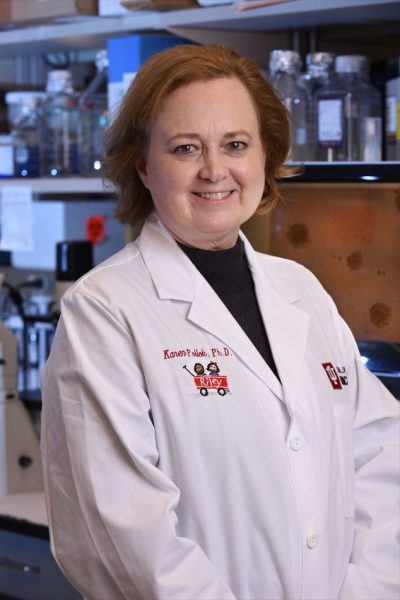
Researchers at IU Simon Comprehensive Cancer Center are working to discover new treatments that could translate to the clinic more quickly and inexpensively than traditional drug development processes.
What if drugs existed that could help treat children with rare brain tumors, but they weren’t being prescribed to these young patients? Researchers at IU Simon Comprehensive Cancer Center hope to uncover such a drug combination hiding in plain sight, among other possible treatments, so every child with a rare pediatric brain cancer has a fighting chance for a healthier, brighter future. The Heroes Foundation is supporting this exciting research with a $10,000 gift.
Leading the project in Indianapolis are investigators Nuri Damayanti, PhD, in the Department of Neurosurgery at IU School of Medicine; and Karen Pollok, PhD, an Associate Professor of Pediatrics in the Department of Pediatrics at IU School of Medicine.

“This research is exciting because it’s highly translational to the clinic and could bring hope to children with rare pediatric gliomas,” Damayanti said. “By repurposing FDA-approved drugs for these understudied cancers, we can potentially offer new treatment options more quickly, improving outcomes for patients who currently have limited therapeutic choices.”
In 90% of all rare diseases, there are no effective treatments, resulting in a drastic decrease in quality of life. Repurposing drugs for new indications represents an alternative method for finding rare disease treatments with compelling advantages — it’s cheaper and faster — over traditional drug development.
The team’s research goal is to find new treatment methods for tumors with a BRAF fusion. In addition to repurposing drugs, they are partnering with a pharmaceutical company to test a new drug designed to inhibit a specific part of the BRAF machinery that is often overactive in brain tumors. And they are studying how to better attack a tumor within its own brain microenvironment.
This kind of innovative thinking is how the cancer fight will be won, which is why providing cancer research funds to world-class partners in Indiana is a key part of the Heroes Foundation’s mission: To provide meaningful support to cancer patients, education to promote cancer prevention and resources to advance research for a cure.
“Given that my family has faced pediatric cancer, I am acutely aware of the significant funding gap in this area,” says Emily Lefebvre, a member of the Heroes Foundation Board of Directors. “It’s fantastic to see that an organization like the Heroes Foundation is providing the opportunity for this outstanding research to take place.” Lefebvre fights cancer in honor of her nephews Brody Stephens and Sam Jackman, and cousin Kelly Chesebrough.
“The Heroes Foundation’s gift enabled us to conduct a crucial glioma tumor modeling study that otherwise wouldn’t have been possible. Based on molecular profiling of the tumors, different combinations of BRAF and MEK inhibitors were tested in rare glioma models, aiming to expand FDA indications for pediatric gliomas beyond the current BRAFV600E mutation limitation. Based on the results of this study, we are now preparing to submit two different publications to share our findings,” Damayanti said.
Rare brain tumors significantly impact children’s lives and those of their families. Low-grade tumors, if inoperable, can impair cognitive function, vision, and speech. High-grade tumors often recur rapidly, causing severe neurological symptoms and developmental delays. Due to their rarity, treatment options are limited, leading to poor prognosis.
“Our overall goal is to develop novel, translatable therapeutic strategies for rare pediatric brain cancers. By studying various models with different molecular profiles, we aim to realize precision medicine for these diverse tumors, ensuring the right treatment reaches the right patient at the right time with the right dose,” Damayanti said.
The Heroes Foundation pledged $10,000 to the IU Foundation in late 2023 to support a pediatric cancer research project. In March 2024, the Heroes Foundation’s Medical Advisory Committee chose this rare brain tumor project as its beneficiary.
Copyright ©2025 Heroes Foundation, All Rights Reserved.